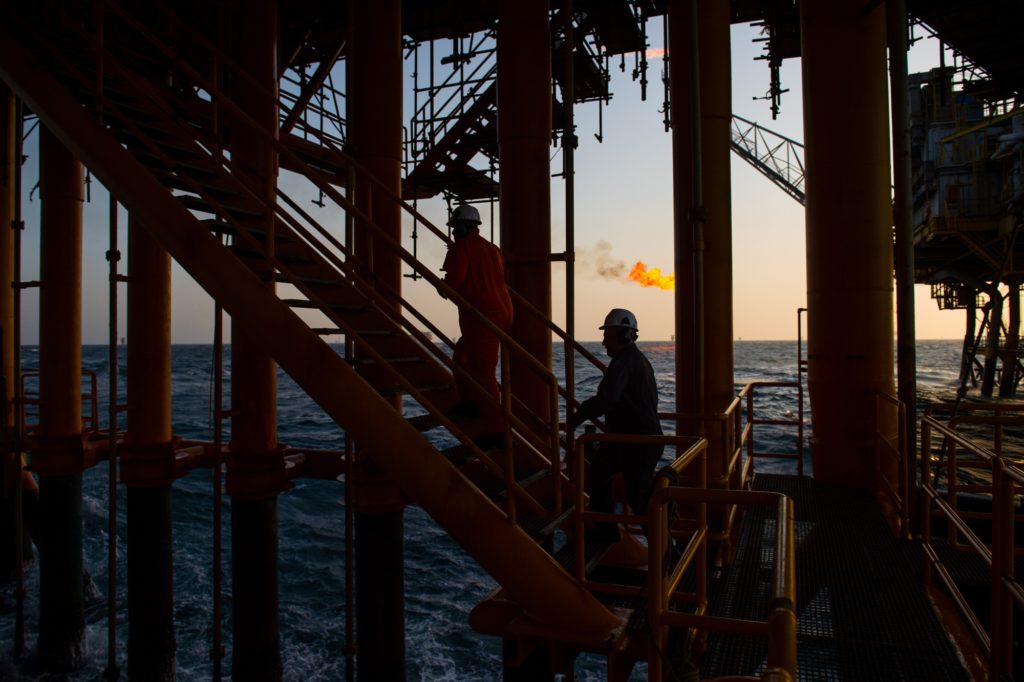
Oil extended its decline to a sixth day as the U.S. defended the temporary waivers given to eight nations to keep buying Iranian crude after American sanctions against the OPEC producer snapped back on Monday.
Crude in New York is set for its longest losing streak in nine months after capping its worst week since February on Friday. The U.S. campaign to put pressure on Iran via sanctions have “had an enormous impact already,” with the Islamic Republic’s crude exports curbed by more than 1 million barrels a day, according to Secretary of State Michael Pompeo.
Oil has slid from a four-year high last month as speculation grew Washington will grant waivers on Iranian sanctions to lower pump prices ahead of the U.S. midterm elections and as other producers among the Organization of Petroleum Exporting Countries pledged to offset any supply gaps. Meanwhile, a trade war between the world’s two biggest economies stoked concern that fuel demand will suffer even as President Donald Trump said he wants to reach a trade pact with China.
“Prices are taking a hit on the news of countries getting American waivers on Iranian crude purchases,” Songchil Will Yun, Seoul-based commodity analyst at Hi Investment & Futures, said by phone. “A bigger-than-expected number of nations were granted temporary waivers ahead of U.S. midterm elections. Following the elections, there’s more downside as a lot of uncertainty remains surrounding the U.S.-China trade war.”
West Texas Intermediate crude for December delivery dropped as much as 1 percent to $62.52 a barrel on the New York Mercantile Exchange and traded at $62.86 on the New York Mercantile Exchange at 3:50 p.m. in Singapore. Futures slid 6.6 percent last week. Total volume traded was about 4 percent below the 100-day average.
‘Maximum Pressure’
Brent futures for January settlement slid 16 cents to $72.67 on the London-based ICE Futures Europe exchange. Prices dropped 6.2 percent last week, the biggest weekly decline in nine months. The global benchmark crude traded at a $9.69 premium to WTI for the same month.
A day before U.S. sanctions on Iran’s energy and shipping were due to be reimposed, Pompeo on “Fox News Sunday,” said the president’s “policy of maximum pressure will be fully in place” on Monday. He wouldn’t say if India and China are getting waivers, or if they’d delivered commitments to stop their purchases.
Bloomberg reported earlier that India, Japan and South Korea are said to be among those approved for waivers, and China — a major importer of Iranian oil — is in discussions on terms but is among the eight countries that will get exemptions.
Other oil-market news: Hedge funds reduced bets on rising WTI crude prices for an eighth straight week, the longest streak of reductions on record. The funds’ net-long position in WTI crude slid 5 percent to 196,196 futures and options in the week ended Oct. 30, according to the U.S. Commodity Futures Trading Commission. Abu Dhabi’s top oil policy body approved a $132 billion five-year budget for the government-owned energy producer to expand crude production capacity and increase output of natural gas. Oil capacity will rise to 4 million barrels a day by the end of 2020 and to 5 million barrels daily by 2030.